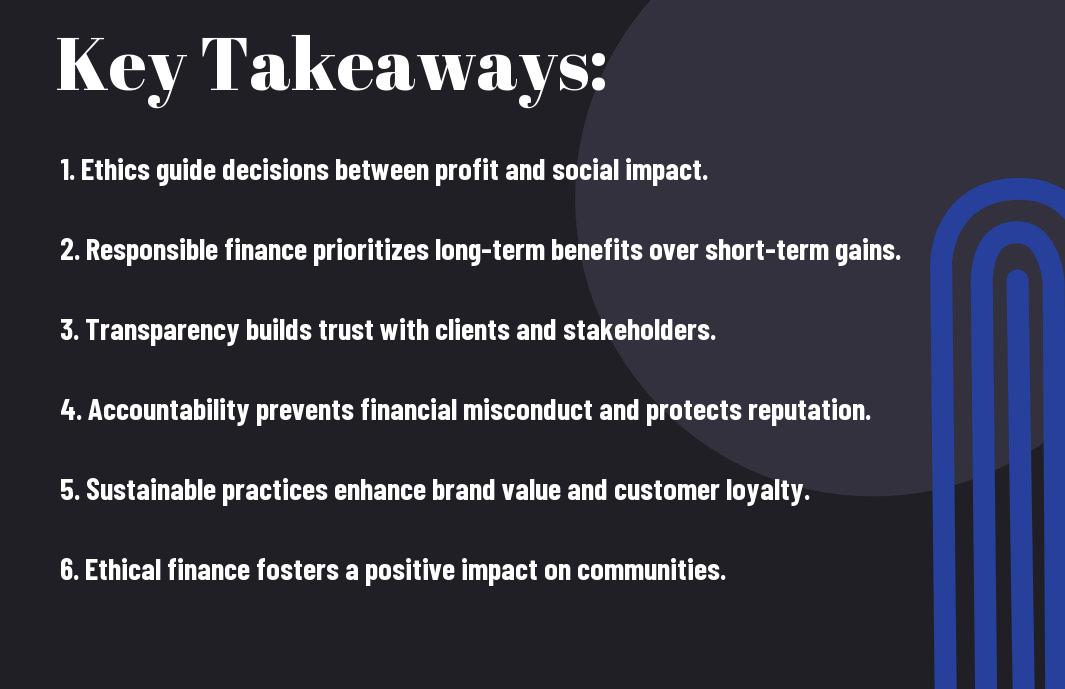Most people in finance focus on making profits. However, balancing profit with ethical responsibility is key to sustainable success. In this blog post, you will discover what it means to operate with integrity in finance. We will explore the importance of ethics, how they influence decision-making, and the impact on society. Understanding these principles will help you navigate the financial world more effectively, ensuring that your decisions benefit not just your wallet but also your community and the environment.
Key Takeaways:
- Ethics in finance involves making decisions that consider both profit and social responsibility, ensuring that businesses do not harm people or the environment.
- Balancing profit and responsibility fosters trust with clients, employees, and the community, leading to long-term success for companies.
- Transparency and accountability are vital for ethical finance, encouraging companies to act fairly and openly in their business practices.


Understanding Ethics in Finance
The financial sector plays a vital role in society, influencing both businesses and individuals. You need to grasp the principles of ethics in finance to navigate this complex field successfully. Ethical practices guide decision-making, focusing on long-term benefits over quick profits. For a deeper look into the subject, check out this article on Ethical Leadership In Business – Balancing Profitability And ….
Definition of Financial Ethics
On a basic level, financial ethics refers to the moral principles that guide financial decision-making. It involves honesty, transparency, and accountability in all financial dealings. When you understand these principles, you can make better choices that support both your goals and the well-being of others.
Importance of Ethical Practices
Ethical practices in finance promote trust and respect. When you act responsibly, you build strong relationships with clients and stakeholders. This trust leads to long-term success and stability for your organization.
Due to the growing awareness of corporate responsibilities, ethical practices are becoming more important than ever. Companies that prioritize ethics often see an increase in customer loyalty and brand reputation. You’re likely to attract more investors and partners when you demonstrate integrity in your financial dealings. Ultimately, ethical practices contribute to a healthier financial ecosystem for everyone involved.

The Role of Profit in Finance
Now, profit plays a significant role in finance as it is the main focus for many businesses. It measures a company’s success and fuels its growth. When companies make a profit, they can invest in new projects, pay employees, and provide dividends to shareholders. Balancing profit with ethical considerations is vital for sustainable business practices. By doing this, you contribute to a healthier economy and society.
Maximizing Shareholder Value
By pursuing profit, companies often seek to maximize shareholder value. This means increasing the stock prices and dividends for investors. When a company is profitable, it can attract more investors. However, the pressure to achieve high returns can sometimes lead businesses to overlook ethical responsibilities. Striking the right balance between profit and responsibility is vital for long-term success.
Short-Term vs. Long-Term Gains
ShortTerm gains may provide immediate results but often come with risks. While quick profits can please shareholders in the moment, they may harm the company’s reputation or financial health in the long run. Long-term gains focus on sustainable growth, often requiring patience and ethical considerations in decision-making. You can benefit from understanding these differences to make informed choices.
Profit stems from various strategies within the finance sector. When you prioritize short-term gains, you might chase quick returns, possibly at the expense of ethical practices. In contrast, focusing on long-term gains allows you to build a solid foundation based on trust and responsibility. Companies that invest in long-term strategies often enjoy greater stability and less volatility, positively impacting their overall success.
Responsibility Towards Stakeholders
Once again, your role as a finance professional involves more than just chasing profits. You must also consider your responsibility to various stakeholders. Stakeholders include anyone affected by your business decisions. This group consists of employees, customers, suppliers, and the local community. Making ethical choices reflects positively on your business and helps build trust. Balancing profits and responsibilities ensures long-term success.
Identifying Stakeholders
At the beginning of any project, you can start by identifying your stakeholders. This step is important for understanding who is affected by your decisions. Employees, customers, investors, and even local communities should all be on your list. Each group has unique needs and expectations. Knowing them allows you to align your goals with their interests.
Balancing Interests with Corporate Responsibility
With awareness of your stakeholders comes the need to balance their interests with your corporate responsibilities. You should seek to maximize profit while also serving the community and protecting the environment. This harmony creates a sustainable business model that benefits everyone involved.
Stakeholders are increasingly looking for companies that prioritize social responsibility. They want to know that your business cares about more than just profits. This means you need to create policies that reflect ethical standards and address stakeholder concerns. Focusing on corporate responsibility not only enhances your reputation but also drives customer loyalty. By investing in community projects or environmentally friendly practices, you can ensure a positive impact while still achieving financial success.
Case Studies of Ethical Dilemmas
To understand ethics in finance, it’s helpful to look at notable case studies. These examples illustrate the challenges of balancing profit and responsibility:
- Enron Scandal (2001) – Led to $74 billion in losses and over 20,000 employees losing their jobs.
- Lehman Brothers Collapse (2008) – Filed for bankruptcy, contributing to a global financial crisis with an estimated loss of $600 billion in assets.
- Wells Fargo Fake Accounts (2016) – Over 3.5 million fake accounts opened, leading to $3 billion in fines and significant reputational damage.
- Libor Rate Manipulation (2012) – Affected billions in loans and derivatives worldwide, costing banks billions in penalties.
Examples in the Finance Industry
Around the finance industry, you can find many instances of ethical dilemmas. Companies often face tough choices that impact stakeholders, customers, and the broader community. Scandals like the Lehman Brothers collapse highlight how financial decisions can lead to severe consequences for many people.
Lessons Learned from Past Mistakes
Examples show that ethical failures can lead to significant financial and reputational harm. In the finance world, this means that valuing integrity is as important as maximizing profits.
This understanding has led many organizations to implement stricter guidelines and ethical training programs. By learning from past mistakes, you can foster a culture of responsibility. Companies that prioritize ethical practices tend to enjoy stronger customer loyalty and better long-term success. Emphasizing transparency and accountability sets a foundation for making sound financial decisions in the future.
Strategies for Ethical Decision-Making
Keep your focus on balancing profits and responsibility. To achieve this, you can implement effective strategies for ethical decision-making. Start by exploring Balancing Profits and Ethical Conduct in the Financial Sector. This approach not only helps you stay compliant but also builds trust with your clients and stakeholders. Make sure to evaluate each decision through the lens of ethical considerations, as this will guide you toward making choices that benefit both your organization and the wider community.
Developing a Code of Ethics
Code of ethics is a written guide that outlines acceptable behaviors within your organization. This document serves to clarify your company’s values and expected conduct in various situations. By establishing a strong code of ethics, you can create a framework that guides employees in making decisions that align with both profit motives and ethical standards.
Training and Awareness Programs
About training and awareness programs, they are crucial for fostering a culture of ethics in your workplace. These programs educate employees on how to identify ethical dilemmas and make informed decisions. Regular training helps reinforce the importance of ethical behavior and its positive impact on business success.
With ongoing workshops and seminars, you can create an engaging learning environment that highlights real-life scenarios. This not only boosts your team’s confidence in handling ethical issues but also promotes a shared commitment to ethical standards. By investing in these programs, you strengthen your organization’s reputation and trustworthiness in the financial community.

The Future of Ethics in Finance
Your financial decisions will increasingly require a balance between profit and responsibility. As potential regulations change and societal expectations grow, the landscape of finance will shift. You will likely see more emphasis on ethical practices. Companies that prioritize ethical issues may gain a competitive edge. Therefore, understanding these shifts will be vital for navigating your future in finance.
Trends Influencing Financial Ethics
Alongside the evolving tastes of consumers, several trends are shaping financial ethics today. Social media is amplifying public scrutiny of financial practices. You are more likely to choose companies that align with your values. Environmental, social, and governance (ESG) criteria are becoming standard terms in evaluating business performance. Adapting to these trends can enhance your financial decision-making.
The Role of Technology in Promoting Ethics
Around you, technology is playing a significant role in improving financial ethics. Many companies now use advanced tools for greater transparency. Blockchain technology, for example, allows for secure and open transactions. This builds trust and accountability. With easy access to information, you can make more informed choices about where to invest your money.
Trends in financial technology, including AI-driven analytics, allow companies to monitor ethical behavior in real-time. Solutions like these help identify areas of concern before they escalate. You can benefit from these innovations by aligning with companies that demonstrate high ethical standards. Ultimately, embracing technology will guide you toward making responsible financial decisions in an ever-changing landscape.
Summing up
Hence, understanding ethics in finance helps you navigate the fine line between profit and responsibility. By considering the impact of your financial decisions on society and the environment, you can build a business that values integrity. Balancing profit with ethical responsibilities not only enhances your reputation but also fosters trust with clients and stakeholders. As you move forward, prioritize ethical considerations in your financial practices to create value for both your organization and the community.
Frequently Asked Questions (FAQ) about Ethics in Finance
Q1: What does ethics in finance mean?
A: Ethics in finance refers to the principles and values that guide financial professionals in their decision-making. It involves doing what is right, fair, and responsible when it comes to managing money and making investments. This includes considering how financial decisions affect not only the company but also employees, customers, and society as a whole.
Q2: Why is it important to balance profit and responsibility?
A: Balancing profit and responsibility is important because companies need to make money to survive. However, they also have a duty to operate in a way that is ethical and sustainable. Prioritizing profit over responsibility can lead to long-term harm, such as environmental damage or negative social impacts. When companies act ethically, they build trust and can achieve lasting success.
Q3: How can financial professionals make ethical decisions?
A: Financial professionals can make ethical decisions by following a few key steps:
- Assess the situation: Look at the facts and understand how decisions affect all parties involved.
- Consult company policies: Follow guidelines and codes of conduct that support ethical behavior.
- Consider the long-term impact: Think about the consequences of choices and how they align with both profit and social responsibility.
- Seek advice: Talk with colleagues or mentors to gain different perspectives before making a decision.
Q4: What role do regulations play in ethical finance?
A: Regulations play a significant role in ethical finance by setting standards that companies must follow. These laws help protect consumers, investors, and the environment. When companies adhere to regulations, they demonstrate their commitment to ethical behavior. This can enhance their reputation and foster trust among customers and investors.
Q5: Can ethical practices lead to better business outcomes?
A: Yes, ethical practices can lead to better business outcomes. Companies that prioritize ethics often see improved customer loyalty, a stronger brand image, and reduced legal risks. Additionally, ethical behavior can attract investors who value responsible business practices. In the long run, making ethical choices can contribute to both profit and sustainability.
Conclusively, ethics in finance is about balancing profit with responsibility. By making ethical decisions, financial professionals can create positive impacts for businesses and society. Always consider the long-term effects of financial activities and strive for a balance that promotes both success and integrity.
Key Takeaways
- Ethics in finance is about doing the right thing in financial decision-making.
- Balancing profit and responsibility ensures long-term business success.
- Follow company policies and consult with others when making ethical decisions.
- Regulations help enforce ethical standards in finance.
- Ethical practices can lead to greater customer loyalty and improved business outcomes.




